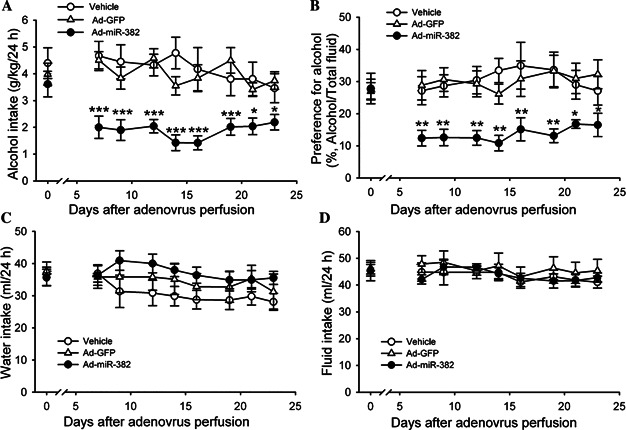Figure 5. Overexpression of miR-382 is sufficient to inhibit the voluntary intake of and the preference for alcohol in rats: the animals (total n = 24) under the intermittent access two-bottle choice drinking paradigm were randomly divided into three groups which received infusion of Ad-miR-382, control adenovirus Ad-GFP or vehicle (saline), respectively, into the NAc.

Seven days later, the rats were allowed to resume ethanol consumption under the same drinking paradigm. The successful up-regulation of miR-382 via Ad-miR-382 was verified by qRT-PCR at 7 days after drinking (Supporting Information Fig S1). The successful modulation of DRD1 and DeltaFosB via Ad-miR-382 was verified by Western blot analysis at 7 days after drinking (Supporting Information Fig S2).
- The voluntary intake of alcohol was reduced via Ad-miR-382 at all points (7 days: p = 0.00039; 9 days: p = 0.00046; 11 days: p = 0.00057; 13 days: p = 0.00026; 17 days: p = 0.00018; 19 days: p = 0.00098; 21 days: p = 0.013; 23 days: p = 0.0035).
- Ad-miR-382 decreased the preference for alcohol at all points (7 days: p = 0.0037; 9 days: p = 0.0041; 11 days: p = 0.0029; 13 days: p = 0.0015; 17 days: p = 0.0088; 19 days: p = 0.0068; 21 days: p = 0.018; 23 days: p = 0.0029).
- Ad-miR-382 did not alter the water consumption.
- Ad-miR-382 did not alter the total fluid intake. Values are mean ± SEM from 8 independent experiments (n = 8), compared with that in Ad-GFP control. *p < 0.05, **p < 0.01 ***and p < 0.001, two-way ANOVA with repeated measure.
